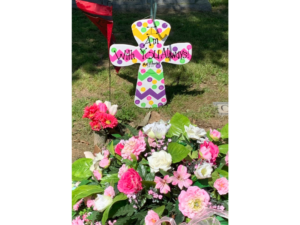“Resilience is accepting your new reality, even if it’s less good than the one you had before. You can fight it, you can do nothing but scream about what you’ve lost, or you can accept that and try to put together something that’s good.” -Elizabeth Edwards.
Like most parents, 2020 presented my family with change beyond measure. In early March, just one week before COVID hit the United States and shut the entire world down, my mother unexpectedly left our physical world (I still struggle with saying she died). We would have to sit by her side for an additional four days while her body eventually succumbed to what her brain had already experienced. The experience of watching my mother take her last breath did not bring me peace or closure the way everyone kept telling me it would. Rather, it was traumatic and chaotic, and trying to put into words everything in the world I ever wanted to tell her but didn’t. It was trying to catch just one more glimpse of my mother’s life before it was too late.
Add to that COVID and all that implied. Not only was my mother taken from me completely unexpectedly, but everything I had known was ripped from me in just a few short days. My children were now with me constantly; my job was at a standstill; I was staying with my dad, trying to help him with all the things that have to be done upon the death of a loved one; and I had no outlet for my grief. I had no resilience in me…or so I thought.
Grieving while also parenting has special challenges. As parents, we want to protect our children not only from the world around them, but also from ourselves. We hide from them our innermost emotions because we do not want them to worry. We pretend everything is okay, rather than show them that we are drowning in our own anxieties. We do not give our littles enough credit that they can handle the fact that we, too, are human and have emotions.
It is said that grief has seven stages: shock and denial, pain and guilt, anger, depression, the upward turn, reconstruction, and finally acceptance. The entire grief process for me has taken a little over a year. Facing the one year mark of my mother’s death was the turning point for me. The very last day I spoke with my mother was on my son’s eighth birthday. The very next day would be the day my life would begin its downward spiral. So, facing my son’s ninth birthday brought an abundance of anxiety and sadness that I tried very hard to hide from him (I failed by the way).
In the end, I sat my son down and explained to him how hard it was for me to face his birthday this year. Surprisingly, my sweet precious baby boy understood more than I realized and embraced me in the biggest hug. I forgot he too was grieving the loss of his Grammy, and he too missed her very much. It actually was a relief for him to be able to talk about his sadness to me that day. Much like myself trying to protect him, he too was trying to protect me from his own grief because he was too afraid to mention how sad he was in fear that it would make me sad.
What I have learned this past year as a parent is that our children do not need to be protected from everything in life. Our children tend to be more resilient than we adults. It is important that we share with them our emotions. How they see us react to traumatic events will shape how they react as little people. My inability to share my grief journey with my family forced my son to create a bubble in which he experienced his own grief journey alone…quite amazingly might I add. And so, that day we sat down and each explained to the other just how much we missed Grammy. We also talked about ways in which we would keep her memory alive, opening the door for acceptance that she is no longer physically with us, but putting together something good in that we can see her in the everyday things of life. Being resilient does not mean we, as parents, must be strong and hide our emotions from our children. Being resilient means allowing our children to experience our emotions with us, and embracing the winds of change, whether gracefully or not. Resiliency isn’t about how easily we pivot, but that we are able to pivot at all and carry on to parent the best way we know how.






